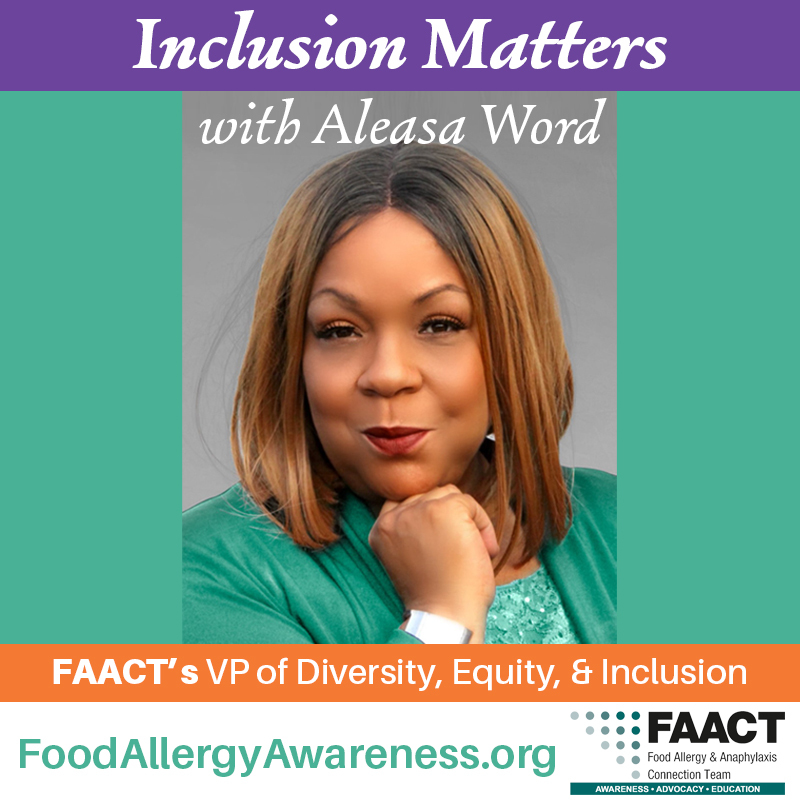Fear: A Gift for Diverse Communities Living with Food Allergies and Anaphylaxis
Subcategories

Fear: A Gift for Diverse Communities Living with Food Allergies and Anaphylaxis
by Aleasa Word, FAACT Vice President of Diversity, Equity, and Inclusion
October 2024
Fear is one of our most primal emotions, hardwired into our nervous systems to protect us from potential threats. For many in the food allergy community, fear is a constant companion, triggered by the unpredictability of living with life-threatening food allergies, anaphylaxis, and co-morbid diseases. Yet, as I have come to realize, fear itself can also be a gift. It’s a message, a signal from our bodies to be aware, to prepare, and, ultimately, to navigate our lives with greater intention and care.
Reading books like The Gift of Fear by Gavin DeBecker helped me reframe the way I understand fear—not as something to be avoided but as something to be acknowledged and harnessed. Fear of food allergens is very real, but in many ways, the fear of being different can be just as powerful. Here are a few ways fear can help those of us in the food allergy community.
Using Fear as a Motivator for Preparedness
In the world of food allergies, fear often motivates action. This fear drives parents and caregivers to read every label, ask critical questions in restaurants, and advocate for their loved ones in schools, workplaces, and healthcare settings. Fear encourages us to keep epinephrine nearby and educate ourselves and others about cross-contact and safe practices. When embraced thoughtfully, fear becomes a tool for empowerment. It cultivates vigilance that can save lives.
In communities of color, this type of preparedness often intersects with cultural resilience. Many of us come from families where survival has meant navigating systemic barriers and learning to protect ourselves in environments not always built for us. In these contexts, living with food allergies can present additional layers of complexity, but it also equips us with the skills to be creative problem solvers.
The Role of Fear in Cultivating Community Support
Fear of exclusion can also compel us to seek and build community. Food allergies often necessitate adaptation in communal spaces, whether it's altering a traditional dish for a potluck or ensuring a school event is allergy friendly. This can be particularly challenging for diverse communities, where food is an essential part of cultural expression and identity. However, it also offers an opportunity to broaden our understanding of inclusivity and redefine how we show care for one another.
Communities that have historically dealt with marginalization may already have tools to help them come together in solidarity. The food allergy community, particularly in multicultural settings, can transform fear into a collective strength by supporting one another through education, advocacy, and sharing resources. When we do this, we demonstrate that fear doesn't have to isolate us; instead, it can bond us in shared experiences of resilience.
The Gift of Awareness
The human brain doesn’t always distinguish between perceived and real threats. This is especially relevant for those of us managing food allergies and accompanying anxieties. Fear, in this context, can sometimes cause our bodies to react to perceived danger, even when there is no immediate threat. However, this heightened awareness isn't something to dismiss—it's something to fine-tune.
For diverse communities, this awareness can extend beyond the individual experience. It becomes a gift we pass on to others, teaching those in our circles to be conscious of differences, to ask questions, and to practice empathy. Fear, when properly navigated, can serve as a constant reminder of our interconnectedness and responsibility to one another.
Transforming Fear Into Advocacy
Finally, fear can be the catalyst for change. Living with food allergies, anaphylaxis, and co-morbid diseases teaches us to be vigilant advocates—not just for ourselves but for others who may not have the same resources or knowledge. Within diverse communities, this advocacy can take on even greater significance. By speaking up, educating communities, and influencing policy, we can turn our individual experiences of fear into systemic actions that benefit everyone.
Fear is not just a burden we carry—it’s a gift we can use to create safer, more inclusive spaces for ourselves and future generations. When faced with life-threatening food allergies, fear can be a motivator for empowerment, education, and community-building. It can propel us to prepare more, learn more, and advocate more. Transforming our mindset around this very basic emotion can turn what might seem like a vulnerability into a strength.

